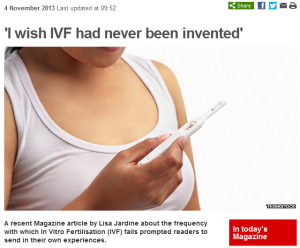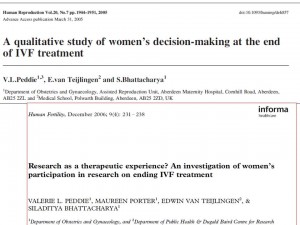
On today’s BBC webpage is a very interesting article under the title ‘I wish IVF had never been invented’ (www.bbc.co.uk/news/magazine-24725655). The article lists comments, experiences and/or feelings from readers of Magazine about the frequency with which In Vitro Fertilisation (IVF) fails.

The article reminded me that some years ago colleagues at the University of Aberdeen and I published a series of articles on the often difficult decision for couples to end IVF treatment after having tried for a long time (1-3). We noted that couples embarking on their IVF programme are full of optimism with unrealistically high expectations. Then we noted that IVF yield only a 20-25 percent pregnancy rate per cycle, today the success rate is still less than one in three for women under 35 according to the Human Fertilisation and Embryology Authority (HFEA), in short many couples leave the IVF clinic childless. We also noted that IVF treatment can also be a source of tension for couples.
We concluded at the time that the decision to end IVF treatment is a complex interaction between (a) the experience of diagnosis of infertility; investigations and IVF treatment; and (b) the emotions around involuntary childlessness. Our results indicated the need for improved psychological preparation of couples who decide to end IVF treatment.
We commented that IVF clinics should adapt their systems to facilitate the needs of this client group and consider a policy, which would help couples ‘plan for the end’ in the beginning. Finally, our study suggested that health care staff involved in IVF care need to examine their roles in providing an environment, which (1) encourages realistic expectations to ensure realistic decisions; (2) offers accurate and consistent information; and (3) deliver an efficient support system, which encompasses listening skills and recognises grief for which at present, there appears to be little validation. Only then, can reflective practice improve service provision for those who decide to end IVF treatment. Reading the various comments on the BBC webpages today suggests to me that many of our original recommendations still have currency!
Prof. Edwin van Teijlingen
Centre for Midwifery, Maternal & Perinatal Health
References
- Peddie, V., van Teijlingen, E., Bhattacharya, S (2004) Decision making in in-vitro fertilisation: How women view the end of treatment Human Fertility, 7: 31-37.
- Peddie, V.L., van Teijlingen E., Bhattacharya, S. (2005) A qualitative study of women’s decision-making at the end of IVF treatment, Human Reproduction, 20 (7): 1944-1951.
- Peddie, V.L., Porter, M., van Teijlingen E., Bhattacharya, S. (2006) Research as a therapeutic experience? An investigation of women’s participation in research on ending IVF treatment, Human Fertility, 9(4): 231-238.
 Latest HSC paper in Birth
Latest HSC paper in Birth










 New CMWH paper on maternity care
New CMWH paper on maternity care From Sustainable Research to Sustainable Research Lives: Reflections from the SPROUT Network Event
From Sustainable Research to Sustainable Research Lives: Reflections from the SPROUT Network Event REF Code of Practice consultation is open!
REF Code of Practice consultation is open! ECR Funding Open Call: Research Culture & Community Grant – Apply now
ECR Funding Open Call: Research Culture & Community Grant – Apply now ECR Funding Open Call: Research Culture & Community Grant – Application Deadline Friday 12 December
ECR Funding Open Call: Research Culture & Community Grant – Application Deadline Friday 12 December MSCA Postdoctoral Fellowships 2025 Call
MSCA Postdoctoral Fellowships 2025 Call ERC Advanced Grant 2025 Webinar
ERC Advanced Grant 2025 Webinar Update on UKRO services
Update on UKRO services European research project exploring use of ‘virtual twins’ to better manage metabolic associated fatty liver disease
European research project exploring use of ‘virtual twins’ to better manage metabolic associated fatty liver disease